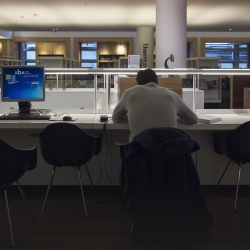To provide the best experiences, we use technologies like cookies to store and/or access device information. Consenting to these technologies will allow us to process data such as browsing behaviour or unique IDs on this site. Not consenting or withdrawing consent, may adversely affect certain features and functions.
The technical storage or access is strictly necessary for the legitimate purpose of enabling the use of a specific service explicitly requested by the subscriber or user, or for the sole purpose of carrying out the transmission of a communication over an electronic communications network.
The technical storage or access is necessary for the legitimate purpose of storing preferences that are not requested by the subscriber or user.
The technical storage or access that is used exclusively for statistical purposes.
The technical storage or access that is used exclusively for anonymous statistical purposes. Without a subpoena, voluntary compliance on the part of your Internet Service Provider, or additional records from a third party, information stored or retrieved for this purpose alone cannot usually be used to identify you.
The technical storage or access is required to create user profiles to send advertising, or to track the user on a website or across several websites for similar marketing purposes.
 The coronavirus pandemic risks cancelling out recent progress in transitioning to clean energy, with unprecedented falls in demand, price volatility and pressure to quickly mitigate socioeconomic costs placing the near-term trajectory of the transition in doubt. Policies, roadmaps and governance frameworks for energy transition at national, regional, and global levels need to be more robust and resilient against external shocks, according to the latest edition of World Economic Forum’s Fostering Effective Energy Transition 2020 report published today. (more…)
The coronavirus pandemic risks cancelling out recent progress in transitioning to clean energy, with unprecedented falls in demand, price volatility and pressure to quickly mitigate socioeconomic costs placing the near-term trajectory of the transition in doubt. Policies, roadmaps and governance frameworks for energy transition at national, regional, and global levels need to be more robust and resilient against external shocks, according to the latest edition of World Economic Forum’s Fostering Effective Energy Transition 2020 report published today. (more…)
























 UK employers claimed £35 billion of free labour last year because of workers doing unpaid overtime, according to an analysis of official statistics published today by the
UK employers claimed £35 billion of free labour last year because of workers doing unpaid overtime, according to an analysis of official statistics published today by the 







May 5, 2020
From the archive: We shouldn’t rely on narrow ideas to define flexible working
by Luke Munro • Comment, Flexible working, Technology, Wellbeing